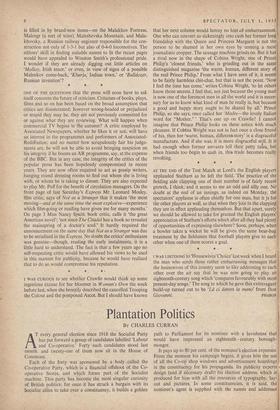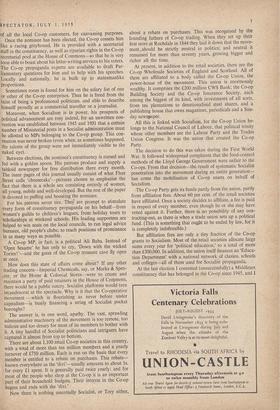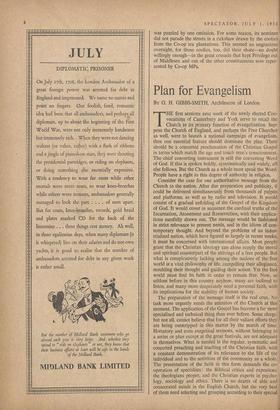Plantation Politics
BY CHARLES CURRAN T every general election since 1918 the Socialist -Party A has put forward a group of candidates labelled 'Labour and Co-operative.' Forty such candidates stood last month. and twenty-one of them now sit in the House of Commons.
Each of the forty was sponsored by a body ,called the Co-operative Party, which is a financial offshoot of the Co- operative Stores, and which forms part of the Socialist machine. This party has become the most singular curiosity of British politics; for once it has struck a bargain with its Socialist allies to take over a constituency, it builds a golden path to Parliament for its nominee with a lavishness that would have impressed an eighteenth - century borough monger.
It pays up to 80 per cent. of the nominee's election expenses. From the moment his campaign begins, it gives him the use of all the Co-op shop windows and advertisement hoardings in the constituency for his propaganda. Its publicity experts design (and .if necessary draft) his election address, which is produced for him with all the resources of typography, lay out and pictures. In some constituencies, it is said, th nominee's agent is supplied with the names and addresse of all the local Co-op customers, for canvassing purposes.
Once the nominee has been elected, the Co-op cossets him like a racing greyhound. He is provided with a secretarial staff in the constituency, as well as riparian rights in the Co-op secretarial pool at the House of Commons—so that he is very soon able to boast about his letter-writing services to his voters. The Co-op propaganda experts are available to draft Par- liamentary questions for him and to help with his speeches. Locally and nationally, he is built up to statesmanlike proportions.
Sometimes room is found for him on the salary list of one or other of the Co-op enterprises. Thus he is freed from the taint of being a professional politician, and able to describe himself proudly as a commercial traveller or a journalist.
Moreover, when Socialism is in power, his prospects of political advancement are rosy indeed, for an unwritten con- vention was established between 1945 and 1951 that a certain number of Ministerial posts in a Socialist administration must be allotted to MPs belonging to the Co-op group. This con- vention was never broken (even when, as sometimes happened, the talents of the group were not immediately visible to the naked eye).
Between elections, the nominee's constituency is nursed and fed with a golden spoon. His patrons produce and supply a tabloid newspaper for free distribution there every month. The inner pages of this journal usually consist of what Fleet Street calls `cheesecake'—pictures chosen to emphasise the fact that there is a whole sex consisting entirely of women, all young, nubile and well-developed. But the rest of the paper is devoted to puffing and boosting the nominee.
For his patrons never tire. They are prompt to stimulate every form of constituency propaganda on his behalf—from Women's guilds to children's leagues, from holiday tours to scholarships at weekend schools. His leading supporters are helped to win seats on the local councils, to run legal advice bureaux, old people's clubs; to reach positions of prominence in as many ways as possible.
A Co-op MP, in fact, is a political All Baba. Instead of `Open Sesame' he has only to cry, 'Down with the wicked Tories!'—and the gates of the Co-op treasure cave fly open at once.
How does this state of affairs come about? If any other trading concern—Imperial Chemicals, say, or Marks & Spen- cer, or the Home & Colonial Stores—were to create and maintain a party of paid retainers in the House of Commons, there would be a public outcry. Socialist platforms would turn incandescent at the spectacle. Why is it that the Co-operativ,e movement — which is flourishing as never before under capitalism—is busily financing a string of Socialist pocket boroughs?
The answer is, in one word, apathy. The vast, sprawling administrative machinery of the Movement is too remote, too tedious and too dreary for most of its members to bother with it. A tiny handful of Socialist politicians and intriguers have captured it almost from top to bottom.
There are about 1,100 retail Co-op societies in this country, with a total of more than ten million members and a yearly turnover of £750 million. Each is run on the basis that every member is entitled to a rebate on purchases. This rebate— known everywhere as the `divi'—usually amounts to about ls. for every £1 spent. It is generally paid twice yearly; and for most of the people who shop at the Co-op it is an important part of their household budgets. Their interest in the Co-op begins and ends with the 'clivi.'
Now there is nothing essentially Socialist, or Tory either, about a rebate on purchases. This was recognised by the founding fathers of Co-op trading. When they set up their first store at Rochdale in 1844 they laid it down that the move- ment.should be strictly neutral in politics; and neutral it remained for more than seventy years, growing bigger and richer all the time.
At present, in addition to the retail societies, there are the Co-op Wholesale Societies of England and Scotland. All of them are affiliated to a body called the Co-op Union, the power-house of the movement. This union is enormously wealthy. It comprises the £200 million CWS Bank; the Co-op Building Society and the Co-op Insurance Society, each among the biggest of its kind, with investments of all sorts, from tea plantations to denationalised steel shares, and a publishing house that owns magazines, periodicals and a Sun- day newspaper.
All this is linked with Socialism, for the Co-op Union be- longs to the National Council of Labour, that political trinity whose other members are the Labour Party and the Trades Union Congress. It was the union that created the Co-op Party.
The decision to do this was taken during the First World War. It followed widespread complaints that the food-control methods of the Lloyd George Government were unfair to the Co-ops. From that decision—the result of systematic Socialist penetration into the movement during an entire generation— has come the mobilisation of Co-op assets on behalf of Socialism.
The Co-op Party gets its funds partly from the union, partly from affiliation fees. About 60 per cent. of the retail societies have affiliated. Once a society decides to affiliate, a fee is paid in respect of every member, even though he or she may have voted against it. Further, there is no possibility of any con- tracting-out, as there is when a trade union sets up a political fund. (This is something that ought to be ended by law, for it is completely indefensible.) But affiliation fees are only a tiny fraction of the Co-op grants to Socialism. Most of the retail societies allocate large sums every year for 'political education,' to a total of more than £300,000. In addition, the union itself finances an 'Educa- tion Department' with a national network of clashes, schools and colleges—all of them used for Socialist propaganda.
At the last election 1 contested (unsuccessfully) a Middlesex constituency that has belonged to the Co-op since 1945. and I was puzzled by one omission. For some reason, its nominee did not parade the streets in a rickshaw drawn by the coolies from the Co-op tea plantations. This seemed an ungracious oversight, for those coolies, too, did their share—no doubt willingly enough—in the great crusade that kept Privilege out of Middlesex and out of the other constituencies now repre- sented by Co-op MPs.
















































 Previous page
Previous page